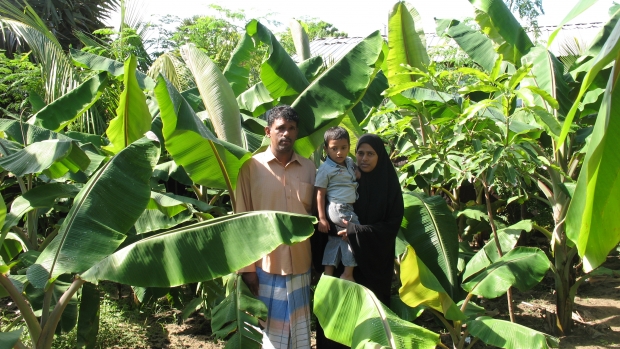Grants :: Small Grant Facilities :: Training and supporting fisher families in Kattankudy to establish banana-based home gardens
Training and supporting fisher families in Kattankudy to establish banana-based home gardens

Homestead Banana cultivation Batticaloa , Sri Lanka © KEkaratne , 2009
Objectives
The main objectives of this project were to create a green living environment, to protect coastal vegetation, to encourage tree planting, and to improve the local people’s living standards.
Background
Kattankudy, famous for its traditional Muslim sweets, is one of the most densely populated towns in Sri Lanka and was badly affected by the 2004 Indian Ocean tsunami. Its inhabitants are generally poor and depend on fishing for their livelihood. For extra income they harvest trees along the coast to sell as firewood, a practice which severely threatens the area’s remaining coastal vegetation.
After much discussion with local people, the idea arose of creating home gardens as an alternative source of income to reduce pressure on and protect the coastal environment. The Organization for Protecting and Ensuring Democracy (OPED), an NGO based in Kattankudy, secured a small grant from MFF to implement a home garden programme with banana as the main crop, a fruit much in demand in the area.
The project involved 20 selected fisher families living in the coastal zone. Each family was given 50 banana suckers, garden tools and enough compost and fertilizer for the first planting. Their progress was monitored regularly with the help of the local Agricultural Extension Office.
Target beneficiaries
Twenty fisher families living in the coastal area of Kattankudy.
Outputs
- Delivery of an awareness programme.
- Provision of banana suckers to 20 fisher families.
- Planting and maintenance of 1,000 banana suckers.
- Planting of other fruit trees and vegetables.
- Introduction of natural fertiliser to protect garden soils.
Accomplishments and challenges
As a direct result of the project, 20 families in Kattankudy became skilled in establishing and maintaining banana plantations, and were able to enhance their income by selling garden produce. The cultivation of banana in home gardens in Kattankudy is now gaining in popularity. After seeing the success of project participants, neighbouring families have started plantations of their own to supplement their incomes.
One thousand clumps of banana were established in the 20 gardens, and are being tended by the beneficiaries. The participating families have interplanted banana with papaya, pumpkin and cucumber. Cultivation is likely to be sustained as a large number of banana suckers is being produced.
The beneficiaries have all benefited economically from the project, deriving extra income from selling banana leaves and the small food crops grown among the banana trees. The families sell banana suckers as planting material, and sell banana leaves to local restaurants to use as plates and to wrap food. Meals are increasingly packed in banana leaves rather than paper, and banana flowers are also used in cooking to add flavour.
After home composting, any surplus dried banana leaves are sold to a nearby composting yard.
Challenges
The main challenge faced by the project was unexpectedly heavy rain, which caused water to pool and stagnate around the base of the banana plants.
Contributions to cross-cutting themes
Gender equality
Women are actively involved in tending home gardens, providing an alternative source of income for fisher families during the storm season when fishing is not possible.
Lessons Learned
Training and awareness programmes are the best ways to achieve project goals, as they motivate people to seek ways of supplementing their income. The success of the project can be attributed to the awareness workshop it organised, as well as a shared recognition of the need to protect the coastal environment and alleviate poverty by developing alternative livelihoods.
The active involvement of the local Agricultural Extension Officer, divisional secretariat and urban council in supporting beneficiaries was also key to the project’s success.
Project Facts
Country
Location
Kattankudy, Batticaloa, Sri Lanka
Topic
Duration
1st Jan 2009 to 31st Dec 2009
MFF Grant Amount
US$3,952
Implementing Partner
Organization for Protecting and Ensuring Democracy (OPED)
40 Shareef Proctor Lane,
Kattankudy – 02,
Sri Lanka
